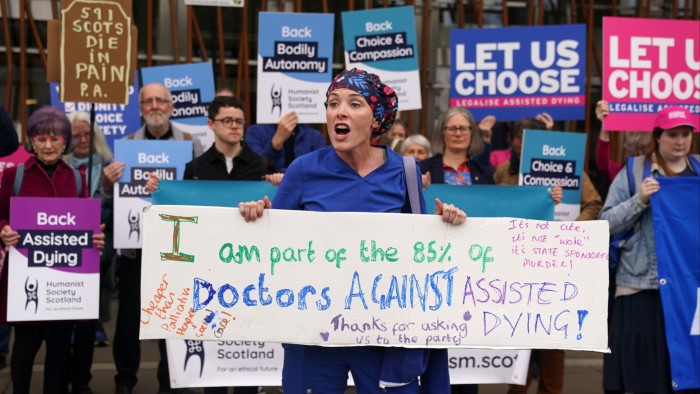Unlock the Editor’s Digest for free
Roula Khalaf, Editor of the FT, selects her favourite stories in this weekly newsletter.
Scotland’s parliament has passed the first stage of a bill that would allow the terminally ill to end their own lives, taking the country a step closer to joining others that have passed similar legislation on assisted dying.
The vote on Tuesday — the third time Holyrood has considered an assisted dying bill — comes as MPs in Westminster consider similar legislation for England and Wales.
Laws passed in countries such as Australia and New Zealand have demonstrated that assisted dying can be offered safely, said Liam McArthur, the Liberal Democrat MSP who proposed the bill.
After an emotional five-hour debate at Holyrood, MSPs voted 70 to 56 in favour of the assisted dying for terminally ill adults bill, with one abstention.
In his opening statement to the debate, McArthur urged his colleagues to grant first-stage approval, thereby allowing amendments to be brought forward ahead of a final vote.
After Tuesday’s vote, McArthur said he would “ensure that this bill is robustly safeguarded, so that terminally ill adults can have the choice of accessing assisted dying”.
The second stage of the bill would see Holyrood’s health committee consider and vote on amendments to the draft legislation, likely after the summer recess.
The final legislative hurdle would then proceed, probably in the new year, and would need to be enacted before parliamentary elections in May.
The draft legislation would require two doctors to confirm adults were terminally ill and mentally fit before they could self-administer a lethal dose. It would also make it an offence to coerce someone into requesting an assisted death.

Pam Duncan-Glancy, a Labour MSP who is disabled, said the bill was a “slippery slope”.
“It is inconceivable to suggest that the introduction of assisted suicide is about choice at the end when so many people do not have choice throughout life. The safeguards are not enough.”
Several high-profile MSPs indicated before the debate that they would vote against the bill, including first minister John Swinney and his predecessors, Humza Yousaf and Nicola Sturgeon.
Swinney, who voted against previous bills on the issue, said he feared the legislation would alter the patient-doctor relationship and could pressure the elderly and sick to end their lives prematurely.
Sturgeon also raised “fundamental” concerns, including fears of a “perceived duty to die”.




